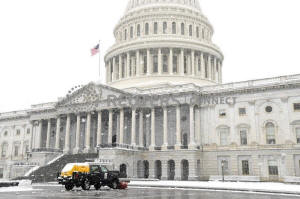|
Half of Americans fault Trump for
shutdown, despite his blaming Democrats: poll
 Send a link to a friend
Send a link to a friend
 [January 16, 2019]
By Chris Kahn [January 16, 2019]
By Chris Kahn
NEW YORK (Reuters) - More than half of
Americans blame U.S. President Donald Trump for the partial federal
government shutdown, despite his repeatedly faulting Democratic
lawmakers, according to a Reuters/Ipsos poll released on Tuesday.
The Jan. 8-14 national opinion poll found that 51 percent of U.S. adults
blame Trump, about the same proportion as a similar poll that ran in the
first week of January. Thirty-four percent blamed Democrats in Congress
and 6 percent blamed Republicans in Congress.
The shutdown dragged into its 25th day on Tuesday with neither Trump nor
Democratic congressional leaders showing signs of bending on the topic
that triggered it - funding for the wall Trump promised to build along
the border with Mexico as part of his hardline policy on immigration.
The shutdown began on Dec. 22 after Congress did not follow through on
Trumpís request for $5.7 billion to help build a new barrier. Chances of
funding the border wall became even more remote in January when
Democrats, who are largely opposed to a wall, took control of the U.S.
House of Representatives.

Republicans held onto the majority in the U.S. Senate following
congressional elections last November in which they lost their majority
in the House.
On Dec. 11, in Trump's first encounter with the congressional leaders of
the newly empowered Democrats, he appeared eager to take responsibility
for any government shutdown.
"I will be the one to shut it down," Trump told Democratic leaders Nancy
Pelosi and Chuck Schumer in a meeting that was nationally televised.
"I'm not going to blame you for it."
He has since tried to shift that blame.
Trump delivered a nationally televised address restating his case for
the wall. He has visited the border and routinely taken to Twitter to
vent about the Democrats' refusal to cooperate.
"At this point, it has become their, and the Democrats, fault," Trump
tweeted on Monday.
According to the poll, about 43 percent of the public supports
additional border fencing, and 25 percent support shutting the
government down until the funding is approved.
[to top of second column]
|

A snow plow operated by the Architect of the Capitol's office, which
is not affected by the partial government shutdown, clears snow left
by Winter Storm Gia, on the U.S. Capitol's plaza, in Washington,
U.S., January 13, 2019. REUTERS/Mike Theiler

Numerous federal agencies have partially closed or asked contractors
to stop working. Coast Guard personnel are working without pay, the
National Park Service has stopped collecting trash, and the
Smithsonian museums have closed their doors to the public.
The White House estimated the shutdown is costing the American
economy 0.13 percentage point in growth every week.
The poll also found that nearly four in 10 adults in the United
States say they are either personally affected by the partial U.S.
government shutdown or they know someone who is.
More than 2,000 respondents were asked whether their family had lost
any income, expected to lose income or relied on any government
services that had been shut down. The poll also asked if respondents
"personally know someone" who had lost income, expected to lose
income, or relied on government services that are now closed.
Altogether, 38 percent said they met at least one of those
conditions. Thirty-seven percent said they have not been affected by
the shutdown, and 25 percent said they do not know.
The Reuters/Ipsos poll was conducted online in English throughout
the United States. It gathered responses from 2,343 adults,
including 1,016 Democrats, 787 Republicans, and 321 independents. It
has a credibility interval, a measure of precision, of 2 percentage
points.
(Reporting by Chris Kahn; editing by Jonathan Oatis and Grant
McCool)
[© 2019 Thomson Reuters. All rights
reserved.]
Copyright 2019 Reuters. All rights reserved. This material may not be published,
broadcast, rewritten or redistributed.
Thompson Reuters is solely responsible for this content.
 |